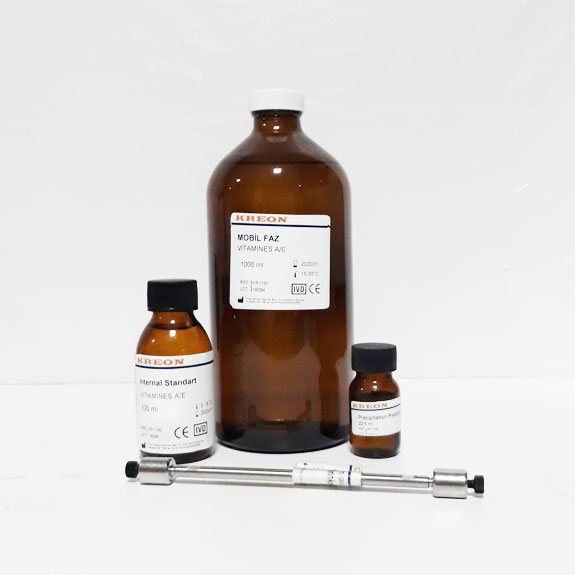VITAMIN A/E (Plasma-Serum) HPLC
VITAMIN A/E for HPLC
INTENDED USE
KR137 Reagent kit for the HPLC determination of Vitamin A/E in Serum-Plasma.
KIT SPECIFICATION
Contents for 100 analyses:
|
Cat no
|
Quantity
|
Reagents
|
|
KR1371
|
1000 ml
|
Mobile Phase
|
|
KR1372
|
1x25 ml
|
Internal Standard
|
|
KR1373
|
1x22,5 ml
|
Precipitation Reagent
|
|
KR1374
|
1x1 ml
|
Serum Calibration Standard
|
ACCESSORIES
|
KR1376
|
1 pc.
|
HPLC Column for the Analysis of Vitamin A/E in Serum-Plazma
|
|
KR1375
|
100 pcs.
|
Reaction Vials, Protected from Light
|
CONTROLS (LIQUID)
|
KR1377
|
1x1 ml
|
Vitamin A/E in Serum-Plazma Control, Level I
|
|
KR1378
|
1x1 ml
|
Vitamin A/E in Serum-Plazma Control, Level II
|
INTRODUCTION
Examples of fat-soluble vitamins are A and E. They are indispensable to animals life for a correct growth and improvement. Vitamin A exists in three oxidation states that are retinol, retinal and retinoic acid. As a group, the several form of vitamin A are called retinoids which are significant to the retina. Moreover, retinoids are necessary for differentiation of epidermoid and glandular cells. Thereby, retinoids may act to suppress the malignant phenotype in transformed cells by promoting expression of normal epithelial genes.
Vitamin E (tocoferol) functions as a chain-breaking antioxidant, inhibiting the propagation of lipid peroxidation, and thus preventing membranes or lipoproteins from oxidative damage. This constitutes an important biological function of vitamin E, since the deterioration of cellular membranes is associated with cellular dysfunction and because oxidative modification of lipoproteins plays a role in the formation of the atherosclerotic plaque. Vitamin E is considered to be regenerated by other antioxidants like ascorbate and glutathione in biological systems. In addition to antioxidant and atherosclerotic activities, vitamin E exhibits a number of other biological activities
EQUIPMENT AND PARAMETERS
The analysis of Vitamin A/E in Serum-Plazma requires a HPLC including isocratic system with HPLC pump, autosampler and UV detector. The use of a solvent degasser prevents air bubbles and ensures a stable baseline.
Sampler: Injection volume 35 μl, analytical run time 9 min
HPLC Pump: Flow rate 0.8 ml/min is recommended
Column temperature: Ambient (~25 °C )
UV detector: 325 nm, after 3.5 min switch to 295 nm
COLLECTION AND STORAGE OF PATIENT SPECIMENS
Vitamin A/E in Serum-Plazma is determined from serum. Storage life is up to 3 days at ambident temperature, at +2 to +8 °C up to 1 week and deep-freeze (-18 °C) for longer storage (up to a maximum 1 year).
SAMPLE PREPARATION PROCEDURE
200 µL serum sample is added to vial.
225 µL precipitation reagent is added.
250 µL internal Standard is added.
Vortex the mix for 30 s
Centrifuge at 13 000 rpm for 5 min.
The upper phase is quickly taken into autosampler vial.



